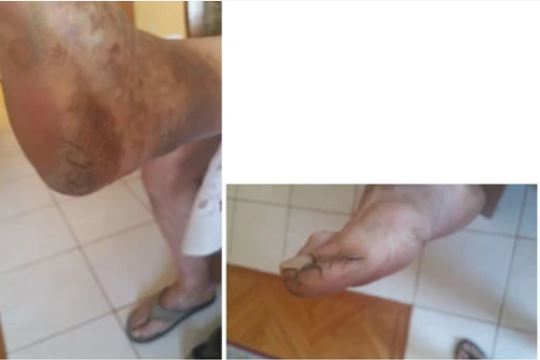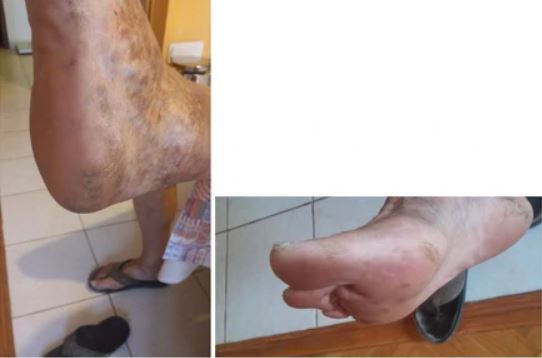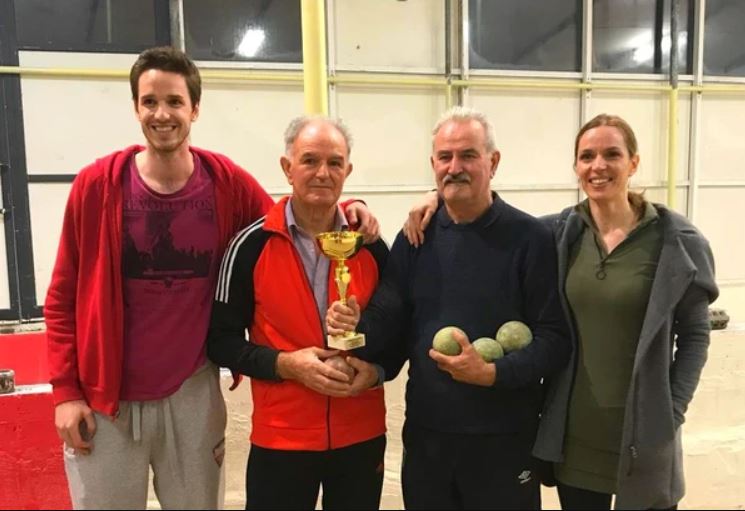Flights to Croatia: WizzAir Announces Wroclaw-Split, Croatia Airlines to Launch Ancona Charter
February 14, 2021 - The latest news for flights to Croatia as WizzAir announces yet another new line to Croatia, this time from Wroclaw-Split Airport, while Croatia Airlines will launch charters between Ancona and Split in the summer flight schedule this year.
Croatian Aviation reports that the WizzAir expansion in Split continues! For the third week in a row, this well-known Hungarian low-cost airline has announced the introduction of another new route to Split Airport.
From June 20, the Wroclaw - Split - Wroclaw line will be introduced, which will be in traffic once a week, every Sunday, until September 12, 2021. A320 aircraft with a capacity of 180 passengers has been announced on this route. On the 13 announced rotations, the Hungarian carrier will offer 4,680 new seats.
This is the third new line to Split in just three weeks. With three new lines from Oslo, Gdansk, and Wroclaw, WizzAir will increase its market share at Split Airport with almost 30,000 additional seats!
Wroclaw is WizzAir’s new, fourth destination from Poland to Split (along with Gdansk, Warsaw, and Katowice). Given the continuous expansion of this low-cost carrier at Split Airport, it would not be surprising if they announced even more new routes to Croatia in the next month.
Ex Yu Aviation announces even more news for Split Airport. Namely, Croatia Airlines will launch charter flights between Split and Ancona in Italy this summer, organized by Italian tour operator Goro Tours.
Namely, flights will operate three times per week, on Tuesday, Thursday, and Saturday, from July 31 until August 28, 2021, driven by the Dash 8 Q400 turboprop.
This is excellent news for Split Airport, which is continuing to see an increase in flight connections this year.
For the latest travel info, bookmark our main travel info article, which is updated daily.
Read the Croatian Travel Update in your language - now available in 24 languages.
Croatian Graduate Perspective: The View from Karla in Split
February 13, 2021 - With many young people emigrating from Croatia, what keeps those who decided to stay (at least for now)? In the new TCN series called Croatian Graduate Perspective, we investigate recent graduates' attitudes about job and life opportunities in Croatia. Karla from Split is our first interviewee. This is her story.
The emigration of young people from Croatia in search of better business opportunities and living standards, unfortunately, is a well-known story. Each of us young people in Croatia knows at least a few people from their environment who, at one point, said that enough was enough and decided to seek happiness somewhere abroad.
According to official Eurostat data, from 2015 to 2019, Croatia's population decreased by 4.26 inhabitants per 1,000 citizens only thanks to emigration. Therefore, the Croatian emigration rate is the second-worst in the European Union (after Lithuania).
These data indicate that economic prosperity influences population decisions to emigrate. Besides, due to the exodus of the young and working population, there is an additional reduction in GDP per capita that closes the cycle of poverty and decline in Croatia.
However, there are many who are aware of the poor position of young people in Croatia, but still do not want to give up and decide to stay in Croatia. We're wondering what do those young people, recent graduates, think about this whole situation and what are their reasons for staying in Croatia.
We begin our series on the Adriatic coast, with Karla in Split.
First of all, please introduce yourself. What are you studying/what did you study? Do you have a job currently?
I'm Karla, and I have a Masters degree in journalism. I live in Split, where I'm originally from. Last year I came back from Zagreb where I had been studying for five years. I'm currently unemployed.
What is it like being a student/recent graduate in Croatia during this coronavirus time?
I honestly don't know which is worse – being a student or completing one's studies during the coronavirus time. In any case, a lot of pressure is in the air, in terms of our own existence, but also the desired career.
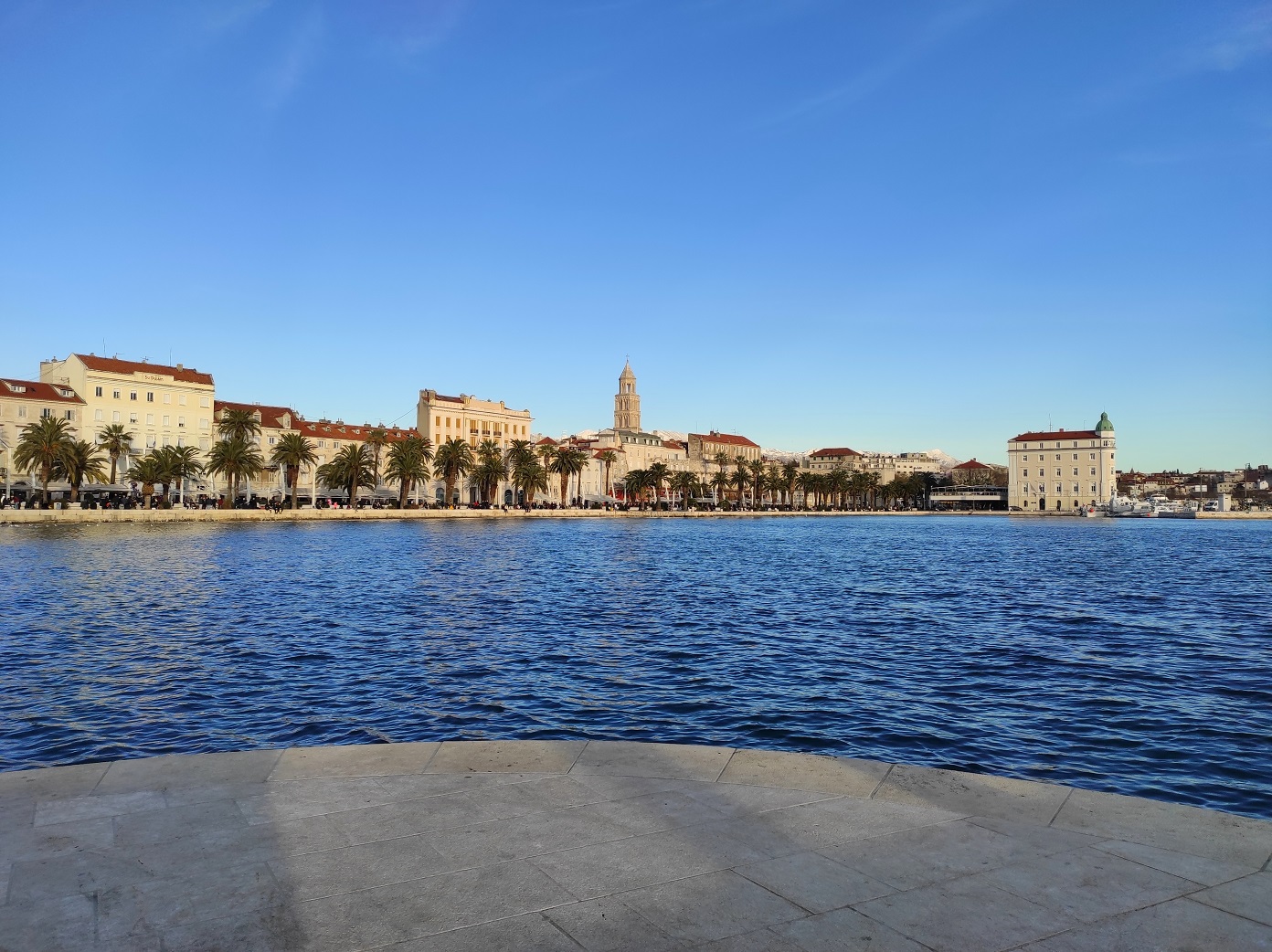
What are your experiences searching for a job in your profession in Croatia?
I honestly think that the ones who want to work can, but the question is what kind of work? If you want to do anything, for a low salary, all Croatian companies' doors are open to you. But if you want to do what you specialize in or something you love, you will have to wait. At least until this coronavirus crisis is over.
What do you think of the Croatian Government's efforts to provide opportunities for graduates?
I think that every ambitious citizen has opportunities. But those who have just graduated have to deal with a lack of experience that will certainly not help them under government grants. And the number one experience you must have in Croatia is printing paper or bureaucratic expertise. The Croatian Government has offered support for self-employment and support for employers in the form of youth employment. It would be nice if young people were educated about their own rights and employment opportunities during their college/high school days.
Many young people your age decide to emigrate from Croatia to find a better job opportunity and/or life standard. What do you think about it?
I support such young people. However, I consider leaving Croatia solely for business a defeat. I do not rush exclusively for money, and the standard of living in Croatia, at least in Dalmatia, where in addition to work and college, we still sit for a few hours having coffee, I consider a comfortable life and luxury. We are in a global world, where, if you are capable and creative, you can profit from anywhere. So why replace the sun and the sea with some continental concrete?

In your opinion, what would encourage young people to stay in Croatia?
Stronger support for purchasing real estate by young people, not only for those who have cash or a secure job for years.
Have you ever considered the option to move out from Croatia?
No, I haven't.
As a recent graduate, what is your impression of the education system in Croatia? What do you think is good about it and what could be better?
We have competent young people who learn a lot during college. But it all stops at the theory stage. Our education would be better if practical experience were always necessary.
Based on your own experience, would you say that everything is possible in Croatia if you work hard, work on yourself, are educated and ambitious?
Hmm, I don't think the state's and individual's characteristics should be so intertwined in one sentence. Yes, I believe it is possible to succeed, but solely because of the characteristics that individual creative minds possess. Ambition and effort alone do not mean much. That is, it means enough that you have a job and how many times you progress in your life. I am ambitious. Almost all my friends are ambitious, but someone just needs to know how to take advantage of the situation, adapt, be different, more unique, and more innovative.
If you could change only one thing in Croatia, what would it be, and why do you think it's important?
I wouldn't change anything! I stick to that you can't change the world – you can only change yourself and your world outlook. I look at Croatia as a combination of sea, mountains, the most delicious food, and tired, complaining, but cheerful and good people.
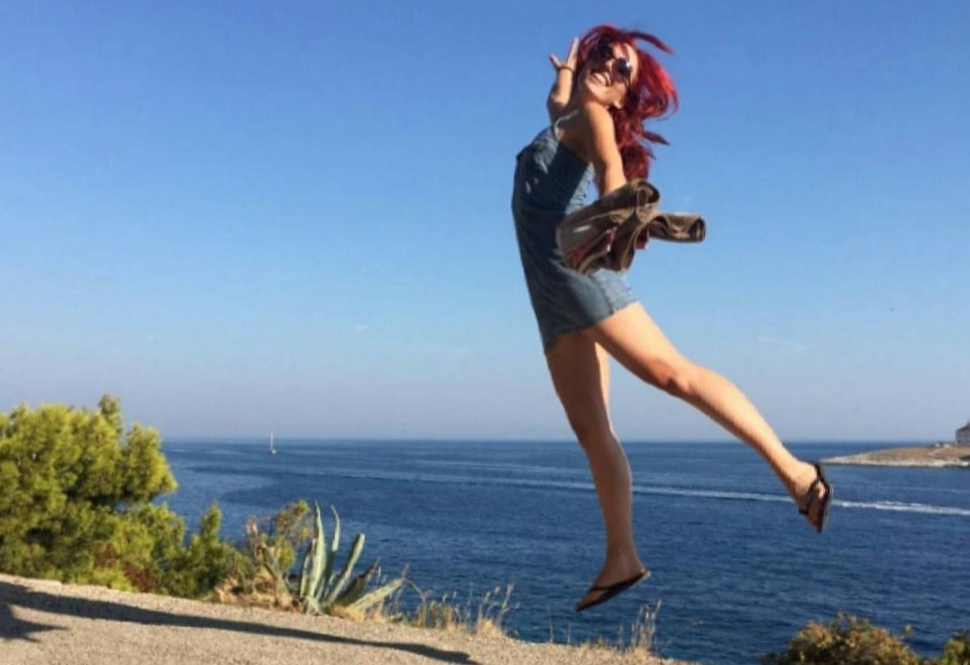
As a young Croatian, what are you most proud of in Croatia?
I am more than proud of people full of empathy, which is confirmed by numerous humanitarian actions. Just look at the number of donations of each humanitarian action and look at the reactions to crises in Croatia.
Are you optimistic or pessimistic about the future of Croatia, and will it be a better or worse place for your children?
I am generally pessimistic about the future in which new generations are growing up, the online future. I wish I could say that my kids will know all the games I loved as a child. I know that Croatia still offers villages, various green spaces where children can have a childhood, so I am in some way satisfied. If I had children, I would be happy if they live a little with nature and socialize in a playful, childish way.
Are you a student or recent graduate who would like to contribute your voice and experiences to this series? If yes, please contact This email address is being protected from spambots. You need JavaScript enabled to view it. with the subject "Graduate."
To read more from series Croatian Graduate Perspective, follow TCN's dedicated page.
Croatia's Default Negativity: a Hong Kong Perspective from Split
February 14, 2021 - There has been a lively discussion on TCN recently after the default negativity in Croatia. We are delighted to welcome Valeria Teo to give us a Hong Kong perspective from Split.
The recent TCN article What Happens When a Foreigner Writes Positively about Living in Croatia? has had my inbox a little fuller than usual, with some very interesting contributions. Among them, Valeria Teo, a Split resident for more than a decade after originating from Hong Kong. Here is her very interesting Hong Kong perspective.

{Photo credits Kilias Hung)
I read this interesting article about what happens when a foreigner writers positively about Croatia as I am entering my 11th year of living in Croatia. In case these questions start popping up in the minds of some local readers, they may rest assured that I am not a millionaire, nor was I running from something in my own country 10 years ago (this may change now but more on that later) and never have I worked for any intelligence agency. It hit me a few days later that these little amusements could actually be serious disclaimers. A new perspective has started to dawn on me. This Croatian negativity on foreigners choosing to live in this country suddenly makes sense to me. What I mean is that I have started to feel the hurt when Croatian people ask foreigners those questions. The 10-year residency here certainly helps me understand the reasons. But I grasp it on an emotional level, strangely, because of what is going on in Hong Kong, the city I have left behind.
When I turned up in places, like a klapa concert or the 100th birthday for Hajduk in Poljud, 10 years ago, local people did not expect to see foreigners, let alone an Asian face. I was answering those typical questions over and over again for quite some time. While having a Croatian husband eased some suspicion, my main reason for moving here raised other eyebrows. They could not understand why a country with an unemployment rate over 20% was a better place to raise kids than a city with almost no unemployment at that time. They saw no future for my son here. Some might even secretly wait and see when the realities in this country would force our departure, sooner or later.
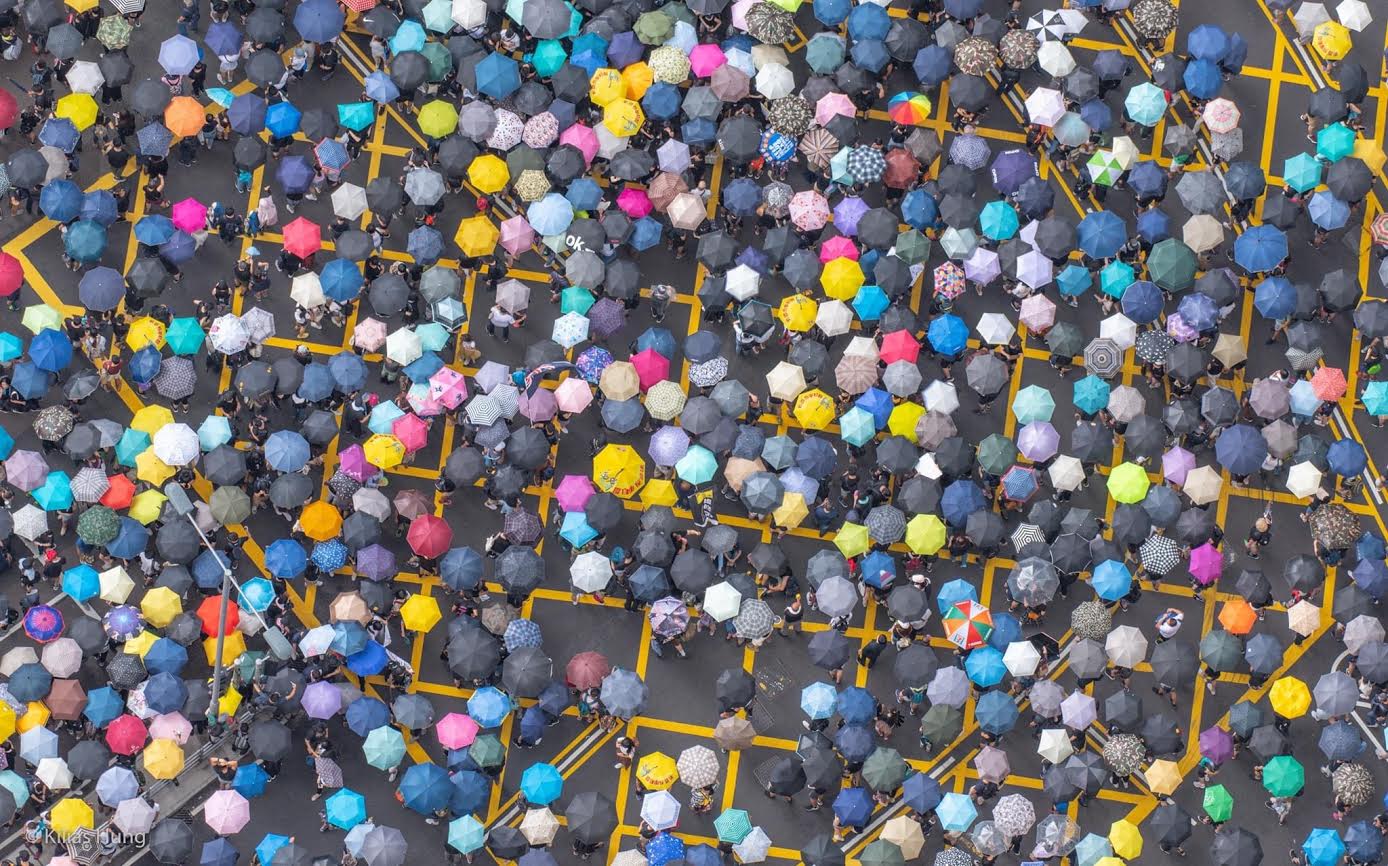
(The 2019 demonstrations - Kilias Hung)
I have met a whole spectrum of local people in the last 10 years. Whether they are positive or negative about their own circumstances or the country in general, almost all Croatians I have met are unwilling to leave their motherland. They love their country but hate the circumstances surrounding their livelihoods in varying degrees. Those who feel more helpless in their own situations are usually the more negative ones. They express it as anger, depression, bitterness or despair with an underlying agony. The desperate ones eventually try to improve their livelihoods by leaving Croatia. But they never think and want the departure to be permanent.
This, for me, is a familiar story because it is very Chinese as well. It happened to millions of Chinese all through history. I notice lots of similarities between Chinese and Croatian people when it comes to family, home and nation. Stability is at the core of our cultural DNA. So it is easy for me to understand the Croatian reluctance to leave their country and their yearning for home. But I did not see the connection between these cultural values and the negative emotions until Hong Kong started going through the biggest political repression and social trauma.

(This is a mysterious facility on the highest mountain in Hong Kong. The government is very vague about who is using it for what. The red slogans were put there at the beginning of 2021. They read from the top in simplified Chinese (Hongkongers use traditional Chinese): Following the (Communist) Party, listening to the Party. Capable of fighting, capable of winning. Photo credits: Lucia Yang)
Similar kinds of negativity are building up in Hong Kong as nepotism, incompetence, injustice and tyranny are spreading like cancerous cells. It is difficult for me to compare the situations of Hong Kong and Croatia. What I have learned after living in both places is that foreigners can "shield" themselves from the smallest to the biggest problems bothering local people on a daily basis. While foreigners can understand or even empathise with the local people, they rarely have the same kind of ownership to those problems. Foreign understanding of the local situation, no matter how deep or extensive, is still some emotional steps away from the local one. So I am in a strange "no man's land" living in Croatia while checking on Hong Kong. But the negativity, expressed in similar nature and intensity in Hong Kong, seems to show me some glimpses into the Croatian sentiments.
Grief and anger start when the unthinkable world is unfolding and turning the familiar life upside down. Outrage and frustration follow when the worse is never the worst. Bitterness and despair seep through when the unacceptable acts become the new normality. People are traumatized in this process whether or not they are trying to find a way out. Venting is a way to keep their sanity and relieve the agony.
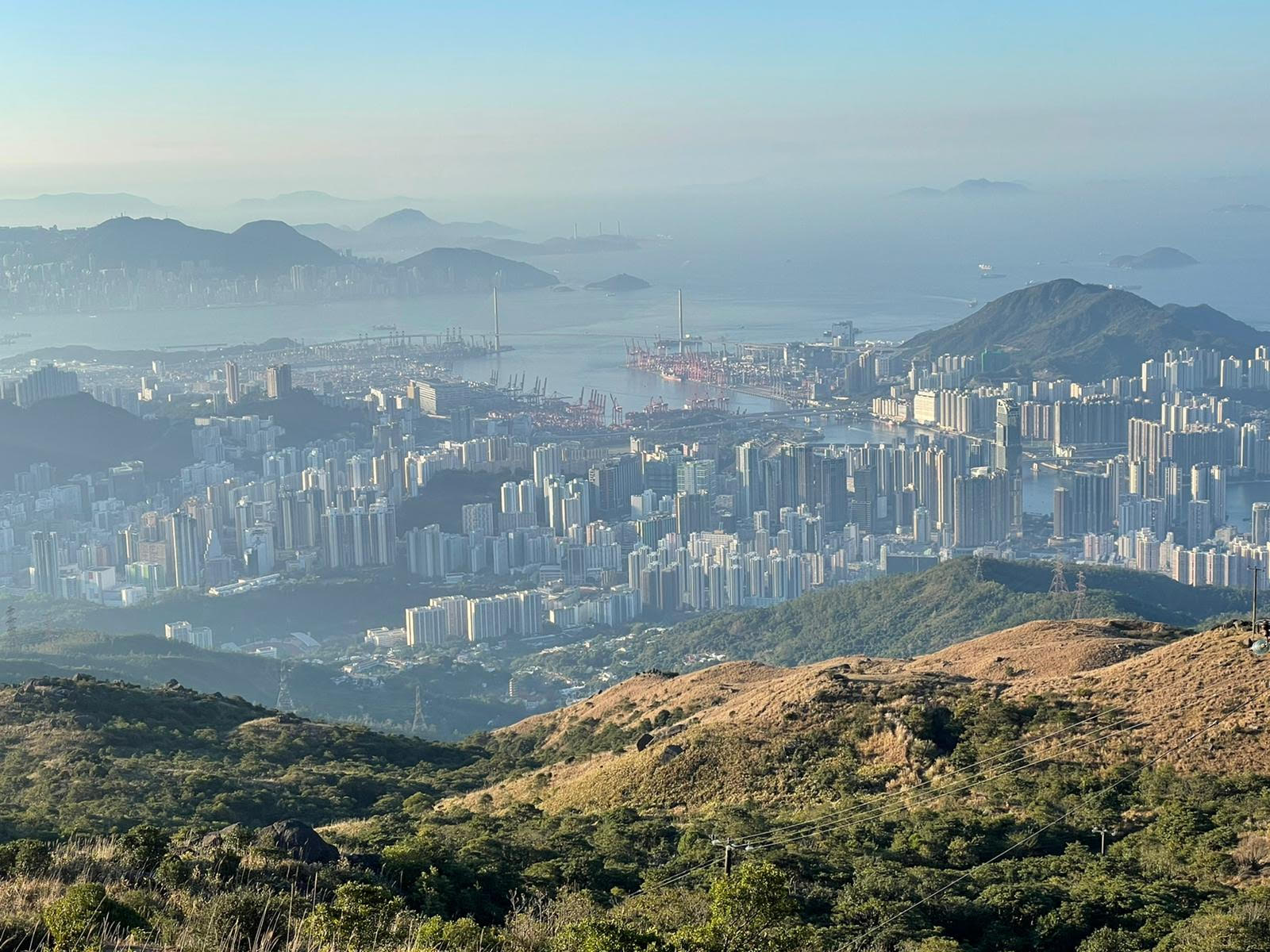
(Photo credit Nelson Tse)
What I have depicted is my own emotional journey through the collapse of a city to which I am not so heavily attached. The hardest blow, for me, is that Hong Kong does not deserve this tragic destiny. When the devastation strikes a place loved as the ultimate home and the best place in the world, the negativity of those people reaches the Croatian level.
I am not saying this is what actually happened to the Croatian people. The collective trauma in Hong Kong I incidentally witness simply gives me a different perspective on what I have experienced here. If Croatia is indeed a precedent of such traumatic malaise, the road of recovery is tortuous. People are just beginning to leave Hong Kong, go into exile, seek asylum or go into jail while the draconian rule is settling in place. Nobody knows how to get out of this dark and seemingly endless tunnel. Many Hong Kong people try to find inspiration and consolation from the works of Vaclav Havel. When I read "Power of the Powerless" 30 years ago, I never thought that it would get popular in Hong Kong. The possibility of that little shop he described in Prague could turn up in Hong Kong is completely surreal. Hope becomes the most valuable thing in the darkest hours. So it comes as no surprise that this quote of Havel's circulates quickly:
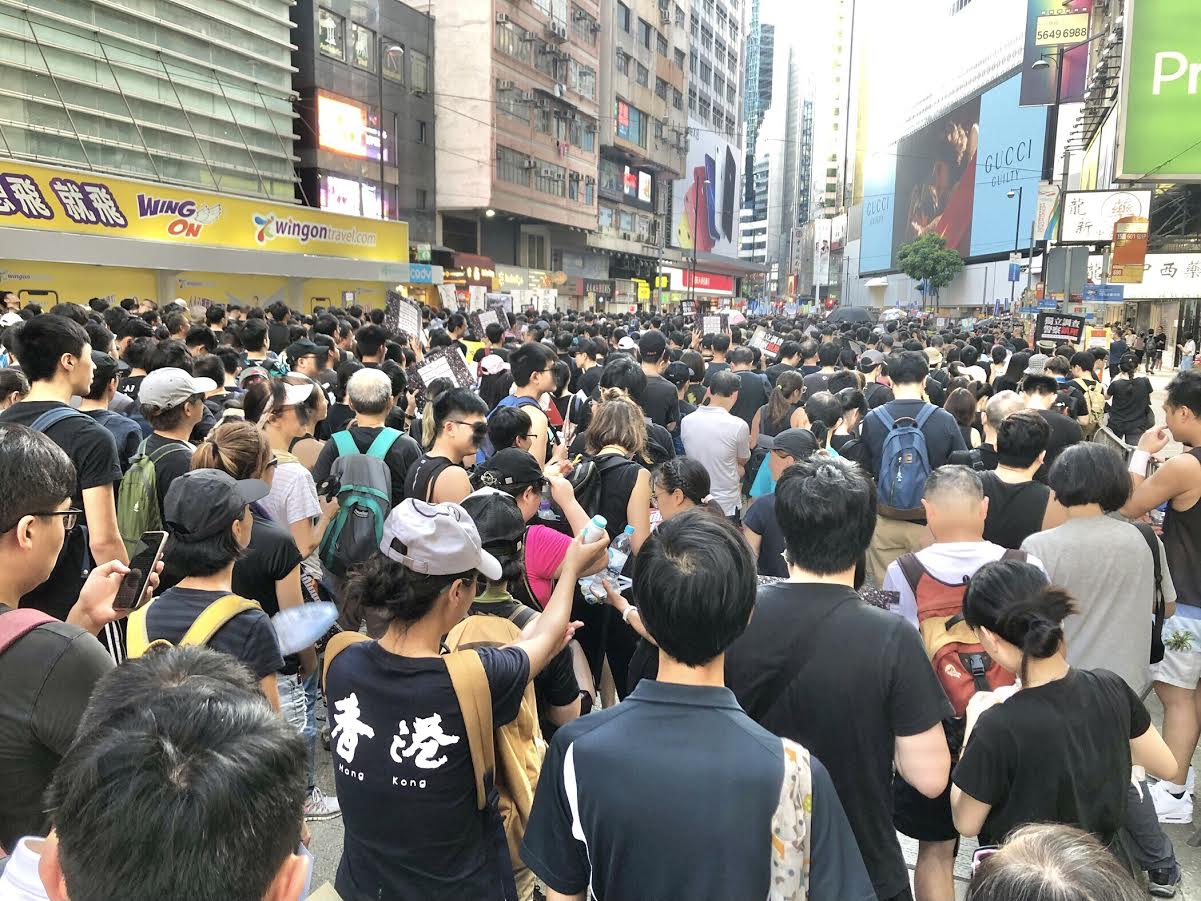
{Photo credits Kilias Hung)
Hope is not a conviction that something will turn out well, but a certainty that something has a meaning regardless of how it turns out.
The situations in Hong Kong and Croatia are completely different now and then. The similarities I have found are perhaps more for my own sake than anything: the kind gestures and the good deeds happening in a country many consider "hopeless" give me hope.
About Valeria Teo:
I left Hong Kong and moved to Split in January 2011 after meeting my husband outside kazaliste in 2007 and getting married in 2008. We have been welcoming guests to our apartments in Radunica since 2014. I also work as a tour leader whenever I feel like having a break from the craziness of being a full-time work at home mother. You may check out our website and follow our Facebook page.
If you would like to contribute to TCN, drop us a line at This email address is being protected from spambots. You need JavaScript enabled to view it. Subject Writing for TCN.
Split Ferry Port Reconstruction: First Investment in 150 Years
February 12, 2021 - The upcoming Split Ferry Port reconstruction and expansion is the first significant investment in 150 years.
At the end of January, the Split Port Authority signed a contract for expert supervision and a contractor to reconstruct and extend Prince Domagoj Coast in the Split City Port. The works are expected to start on February 19, reports Slobodna Dalmacija.
As was announced earlier, at the beginning of December 2020, the community of bidders "Pomgrad inženjering" and "Građevno Zec" was selected, with a bid of HRK 30,556,248.91.
Two applications were also received for expert supervision, and the community of bidders "Kozina projekt" and "Terestrika" was selected, with a bid of HRK 834,187.50. "Oslonac" from Split demanded HRK 550,000 for its services. They were initially evaluated as the most favorable, but because they hired an expert with no experience in supervising higher-value projects, they lost points, and another was selected.
At the beginning of December, when signing the grant agreement for this project, Director Vice Mihanović announced the start of works at the end of 2020 and their completion within nine months.
However, as Slobodna Dalmacija has learned from the Port Authority, the public procurement procedure is such that the contract was signed only on January 26. The works will begin on February 19. They will be completed in 280 calendar days from the contractor's introduction, or about nine months. Thus, putting the new coast into operation is expected at the end of 2021.
The project does not envisage the road closure, and Mihanović has previously stated that, if that happens, the works will be interrupted during the season.
This project was financed through the "Renaissance on the Croatian Coast" project launched by the Ministry of the Sea last year. The estimated value is HRK 42.6 million, of which HRK 36 million was financed from the Cohesion Fund and the remaining amount from the state budget.
The reconstruction and expansion project is the first major investment on Prince Domagoj Coast after 150 years when it was created by pouring surplus material from the railway's excavation. Reconstruction is planned in its entire length in two phases, from the Lazaret shore to St. Peter's Pier and from St. Peter's Pier to St. Duje's Pier.
The upgrade will enable the functioning of the operational shore for mooring and unmooring catamarans by separating the operational coast into the part for mooring, loading, and unloading, and the supply of ships from the part that serves for pedestrian communication. The green belt will separate part of the operating area used by cars and trucks to board ferries.
Currently, the coast is about four meters wide, and the plan is to expand to nine and a half meters towards the sea, with a total length of 260 meters. It will be paved with stone and equipped with utilities, lighting, supply cabinets for ships, additional green areas, and decorative floor panels that will visually separate the part for mooring, boarding, disembarking, and supplying ships from the part used for pedestrian communication. The project also ensures accessibility for people with disabilities.
To read more about business in Croatia, follow TCN's dedicated page.
Expats in Croatia/Pandemic Edition: Michael Freer, from UK in Split (VIDEO)
February 10, 2021 - The global pandemic rages on and we’re still locked down with restrictions and social isolation. Some people are surviving and others are thriving. What’s their story? Episode #3 with… Michael Freer from the UK.
It’s almost one year since the World Health Organization declared covid-19 a global pandemic on March 11, 2020. Nobody expected what came next and certainly nobody expected things to last this long. But here we are, wondering when it will be over and hoping the vaccine will restore some sense of normalcy.
In the meantime, how are people filling their days? When it’s all said and done, how do they want to remember this time looking back? In this new series we’ll hear from all sorts of people in Croatia about their pandemic experience and their predictions for the future.
Episode #3 with… Michael Freer from the UK.
Since arriving in Croatia nearly 6 years ago, Michael Freer has become somewhat of a local celebrity on the Split scene. For a guy who’s lived in multiple countries around the world—Spain, Argentina, and India for six months or more, and Cambodia for two years—he’s a “regular” around here. A little background… in Cambodia he worked for a school on curriculum development and he managed volunteers. He also had a factory gig implementing social accountability standards. Here in Split he runs his own company supporting early stage social enterprises and dedicates one day a week to working for a nonprofit, supporting foreign entrepreneurs for an EU project. Outside of all this, or perhaps because of it, he’s constantly networking, meeting new people, and getting his hands into all sorts of innovative projects. Commendable stuff, but what made the biggest impression on this girl? It was this, “oh yeah, I swim all year long, I go in the water every week.” Anyone who can jump in the Adriatic in these winter temperatures is celebrity-worthy in my book. And one more “plus” on my checklist, he learned how to make goat cheese during lockdown. Yum!
Story and photographs ©2021, Cyndie Burkhardt. https://photo-diaries.com
For more of Cyndie's experiences, check out her Croatia Through the Eyes of a Digital Nomad column.
Are you an expat in Croatia who would like to share your experiences during the pandemic in Cyndie's video series? If yes, please contact her on This email address is being protected from spambots. You need JavaScript enabled to view it.
We are also keen to interview any digital nomads who have successfully applied for the new visa, after the first success in Istria - Meet Melissa Paul, Owner of Croatia's First Digital Nomad Visa. Please contact us on This email address is being protected from spambots. You need JavaScript enabled to view it. Subject Nomad Visa.
City of Trogir Third in Croatia to Introduce Full Budget Transparency
February 9, 2021 – By introducing an interactive mobile application for full budget transparency, the City of Trogir will soon join the Croatian cities of Split and Bjelovar and the municipality of Omišalj and become one of the most transparent local governments in Croatia.
Together with the Science and Society Synergy Institute, the City of Trogir signed an agreement to introduce the city budget's full transparency. The contract represents the first phase of a project to create a simple and visually attractive application that would give citizens a different budget view.
With the application, citizens would have an insight into ongoing or planned projects, the performance of previous budgets and the budget for next year, or the supplementary budget for the current year. The application would provide an overview of the current budget. At the same time, additional options will compare the plan with the performance and a comparison with previous years' budgets.
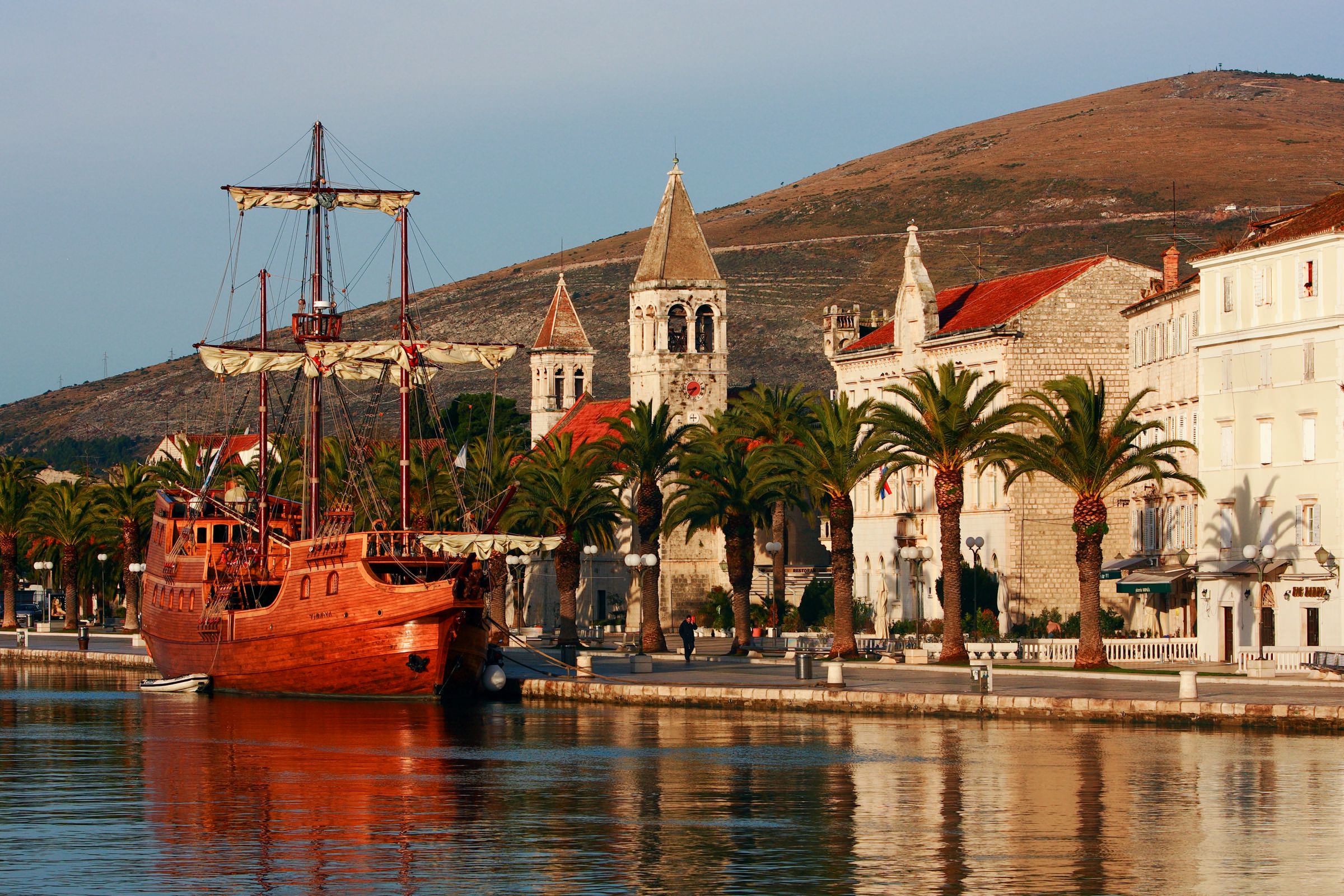
Trogir / Photo: Romulić and Stojčić
Trogir to become the most desirable small town on the coast
The City of Trogir wants to bring concrete budget items closer to the citizens through clear and simple numerical indicators and through aggregate indicators that are difficult to understand. They want to educate and sensitize citizens for certain types of strategically important projects. In other words, citizens would get an insight into what exactly their money is spent on.
"Through this project, we continue to introduce smart practices. The goal is to show how city money is managed and involve citizens in the City Administration's work as much as possible. So far, we have done this through participatory budgeting, 'And you are asked!', a project through which citizens themselves directly decide on spending part of the budget money. Last year, the Institute of Public Finance gave us grade five for transparency for the first time. We have also published an online register of city property, and with this application, we are going a step further," said Mayor of Trogir Ante Bilić.
The average assessment of Croatian cities' transparency for 2020 is 4.5, compared to the previous 2019 when it was 4.3. In 2019, Trogir received a grade of 4, and in 2020, thanks to the publication of all five city documents required for insight into transparency, a rate of 5. The number of Croatian cities of excellence increased from 65 in 2019 to as many as 87 in 2020, a positive trend.
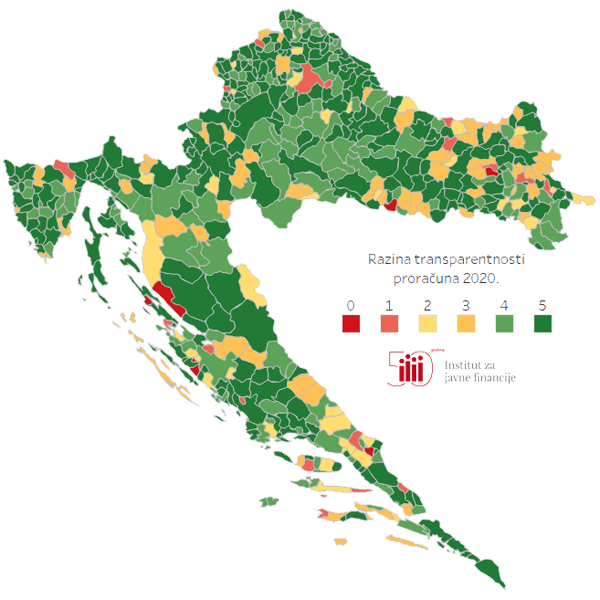
Budget transparency of Croatian cities and municipalities / Institute of Public Finance
"Budget transparency is our obligation and one part of the smart city strategy we will develop this year. This is a necessary level of development planning by which we want to make Trogir the most desirable small town on the coast in every sense. Precisely such projects by which we raise democratic standards are a guarantee that we will never end up in the problems we were in three years ago," said Bilić.
Striving for complete city transparency
This interactive visualization of the budget will be available to citizens in two months. It will be implemented by the Science and Society Synergy Institute based in Čakovec, headed by Vuk Vuković.
"The application we will create for Trogir offers an in-depth and visually attractive presentation of all revenues and expenditures up to the fourth level of the budget, according to the functional and economic classification. This data, the functional classification up to the fourth level of spending, has not been given to city councilors at budget hearings who receive budget expenditures up to a maximum of the third level. For example, the fourth level means that you can enter within each city's budget user – kindergartens, schools, museums, libraries – and see who spent how much on salaries, maintenance, what they bought, etc. The third level gives only the total amount received by which user, without going into details. With this presentation, citizens have a more detailed insight into city spending than city politicians," Vuković explained.
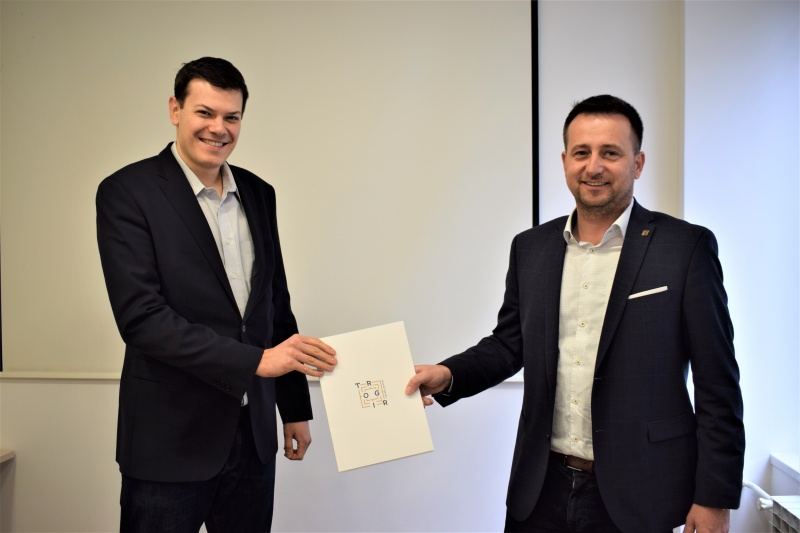
Ante Bilić and Vuk Vuković / Photo: Trogir.hr
Following an interactive budget guide, the next step will be a detailed overview of all budget accounts. Citizens would have an insight into each transaction from the budget, from public procurement to entertainment expenses. Then there will be complete transparency of the city towards users.
Bjelovar was the first to introduce transparency application
Thus, Trogir will be one of only three cities in Croatia and Southeast Europe with a completely transparent budget. A similar practice has been introduced by the Croatian cities of Bjelovar and Split and the municipality of Omišalj, which also introduced applications for insight into the city budget. The City of Bjelovar presented a similar application in February 2019. Vuković also helped them, making them the first most transparent city in Croatia, for which they were awarded that year.
"Bjelovar has thus embarked on a unique undertaking in Croatia and this part of Europe, which is to raise transparency to a level that has not been introduced in any public authority so far, to raise the quality of the City Administration's work and strengthen public confidence," said Vuković at the time, as reported from Bjelovar.
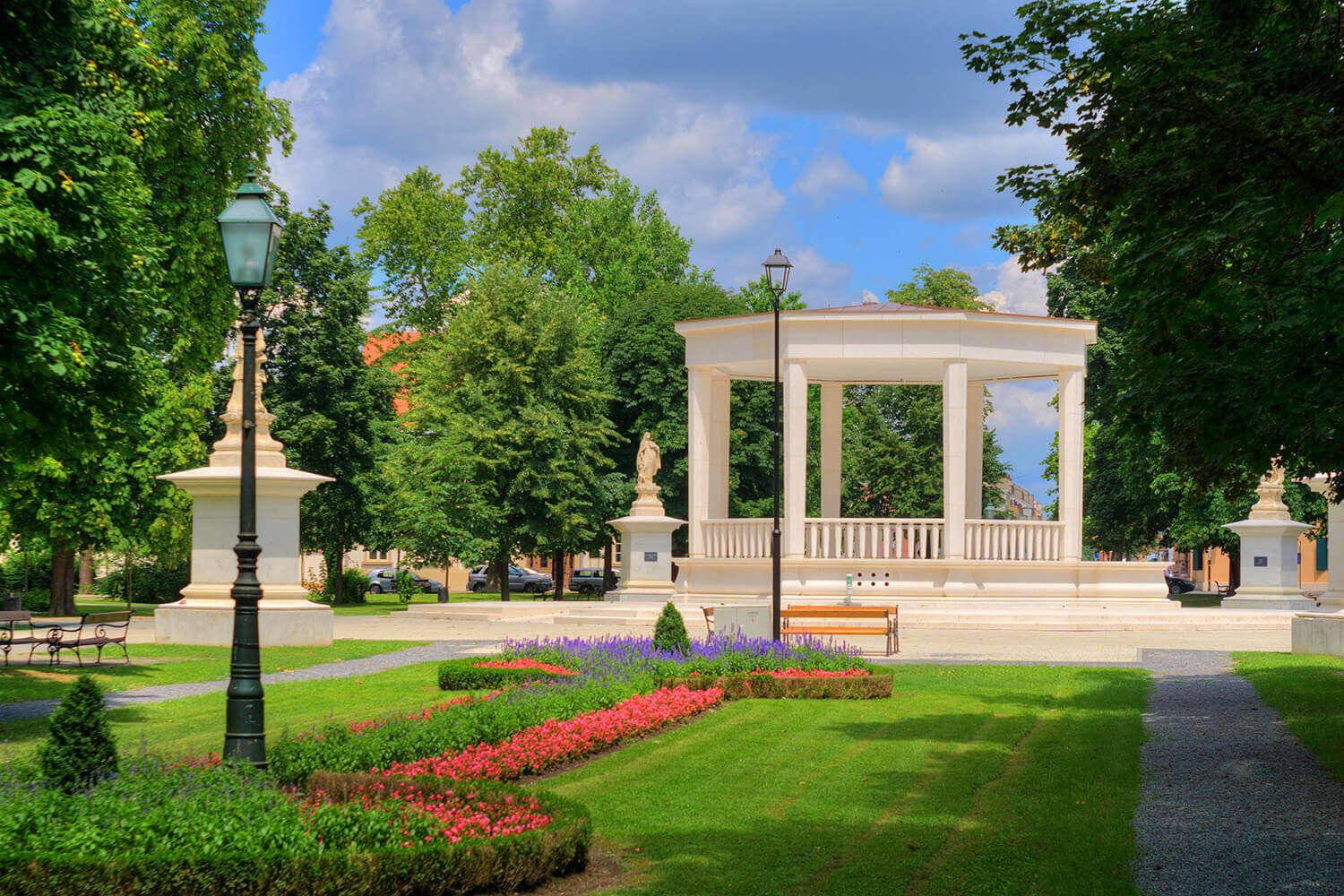
Bjelovar Pavilion / Photo: Bjelovar.hr
Bjelovar's positive example was followed by the municipality of Omišalj, which introduced the transparency application at the end of March 2020. The largest Croatian city on the coast – Split – also decided to do so, and neighboring Trogir took over its practice.
Namely, the citizens' right to access information held by public authorities is guaranteed by the Republic of Croatia's Constitution. Therefore, in addition to the moral, the public authority also has a legal duty to provide information on public money spending. However, while in developed democracies such transparency is considered the standard and, for example, all individual transactions from the US federal budget of 1.5 billion dollars are available to the public through an interactive Internet search engine, in Croatia it has never existed before, nor are public authorities considered this possibility.
This trend seems to be changing in Croatia. The transparency of Croatian cities is presented in an interactive map of the Institute of Public Finance.
To read more about lifestyle in Croatia, follow TCN's dedicated page.
Split University Electronics Engineers Design Chips for CERN
ZAGREB, 8 February, 2021 - Three young electronics engineers at the Split Faculty of Electrical Engineering, Mechanical Engineering and Naval Architecture are participating in the design of chips for CERN, using state-of-the-art tools and methods at the forefront of technology, the faculty said on Monday.
It became involved in the design of chips for the European Organization for Nuclear Research (CERN) in cooperation with Fermilab in Chicago.
"We have designed parts of a chip for a new generation of detectors at CERN in cooperation with Fermilab which, given the successful first results of the design, invited us to participate also in the design of newer generation chips," said Josip Vasilj, assistant dean for science.
This success, he added, justifies the Split University's status as the most successful in Croatia and one of the most successful in this part of Europe.
For more Croatian innovation, check out the TCN Made in Croatia section.
PHOTOS: Transformation of Gajo Bulat Square in Split Begins
February 8, 2021 - The transformation of Gajo Bulat Square began in Split last week, which should be completed by May this year.
By removing the asphalt layer, the transformation of Gajo Bulat Square, the famous mayor of Split, and the great Croatian national revival from the end of the 19th century, began last week. The beginning of the works was attended by the Mayor of Split, Andro Krstulović Opara, together with associates and contractors, designers, and authors of the monument, which will soon be located on the future square.
"Gajo Bulat Square has a prominent historical, urban, and cultural significance in the city of Split. We will restore the aesthetic and urban identity to this valuable urban space, which it has lost in the past decades. With the figure of Gajo Filomen Bulat, we offer the honor and lasting memory of the leader of the populist movement of the Croatization of the Split municipality. With the future fountain, we emphasize the water which was of crucial importance in this part of the city and which, in fact, as good water, gave the name to this part of Split - Dobri. The key thing is that we return the squares and parks to the people of Split," said Krstulović Opara.
The works envisage the renovation of the staircase in front of the HNK building, erecting a monument to Gajo Bulat, then arranging the associated area with a monument to former sources of drinking water, and arranging the parks with trees and lush shrubs. It is important to note that the floor and public area around the monument to Gajo Bulat will be paved with stone slabs. The entire space of Gajo Bulat Square, after its renovation, can also serve as an outdoor, open stage of the Split Theater. The works are worth 3.7 million kuna, and the renovation is expected to be completed in early May.
The renovation of the Square was preceded by the renovation of the facade on the Croatian National Theater building, worth 500 thousand kuna. The foyer inside the building was also renovated, and an elevator for people with disabilities was installed last year. In May last year, the asphalt around the Square was repaired, and the Priuli rampart is currently undergoing conservation and restoration. By May this year, when Gajo Bulat Square's renovation is complete, this part of the city will take on a completely new look, says the City of Split.
To read more about lifestyle in Croatia, follow TCN's dedicated page.
Mushroom Cups, World's 1st Speciality Chanterelle Gourmet Coffee, from Croatia
February 6, 2021 - Another fabulous Croatian start-up, with quite a story about its origins. Looking for a healthy energy boost in your morning coffee? Meet Mushroom Cups.
I learned a lot about mushrooms this week.
Although my inbox is a battle I will never win, I do enjoy the varied curveballs it throws my way. It is one of the things that keep this job so interesting - every day is different, and the inbox never fails to disappoint.
Among the gems this week was an introduction from a friend to a company called Mushroom Cups:
Hi Paul,
Please, meet Stipe - a great entrepreneurial story, HQ in Solin, winning European awards with their super mushroom injected beverages.
And so my fungal journey began. Mushroom-injected beverages? My mind went back to my student days at Manchester University - what could this one possibly be about?
And what a fantastic story, as Mushroom Cups CEO Stipe Rezic enthusiastically filled me on his award-winning and highly unique range of products that are already benefiting people in various ways.
Stipe is a former professional basketball player, who played for the Croatian national team for several years. As part of his efforts to be at his sharpest, he tried new supplements, diets and exercise methods. One of the downsides of such as approach was the detoxing from artificial supplements, which even necessitated the need for surgery at one point.
And then the first mushroom transformation in his life, with the discovery of cordyceps mushrooms. The effect was magical - so much energy from the moment he and his teammates started taking it at the University Championship in Cordoba. And that additional energy manifested itself into success. From rank outsiders (the Croatian Basketball Association had even booked return flights two days before the final), our cordyceps mushroom heroes went on to overperform and take the silver medal.
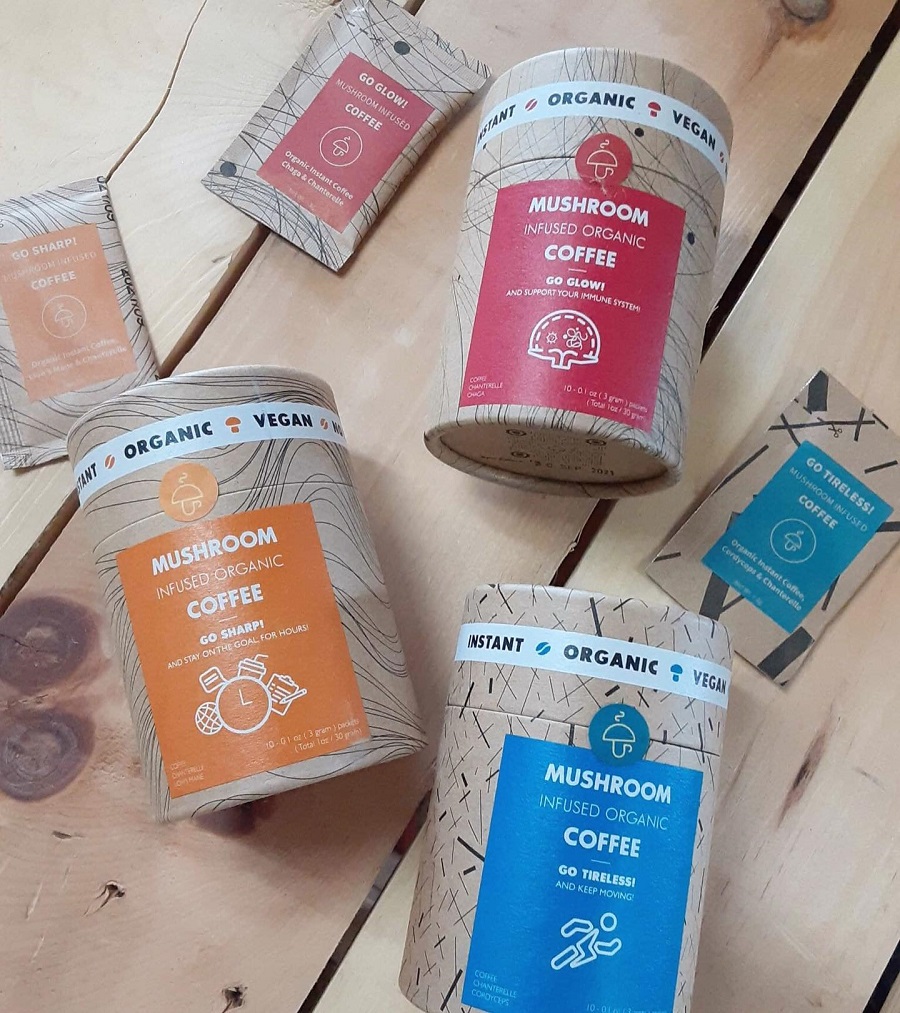
The second phase of the mushroom development was even more personal, involving Stipe's father, who had a rare allergy which made the skin on his feet crack all the way to the blood. The simple act of walking was enough to start the bleeding, and his blood pressure was all over the place. Doctors, diets, various types of medicine were all to no avail, and then Stipe learned that of the 20 most important medical innovations in the 20th Century, 10 of them were derived from mushrooms. He thought back to his cordyceps mushroom experience and had a hunch that the solution lay in mushrooms.
And so it proved.
The journey was not without ridicule and doubt, but gradually Stipe found a community of people with impressive references and critical minds who considered his idea viable. By working with them and taking inspiration from their mushroom success stories, he continued his research, eventually making one jar of home-made mushroom extract mix.
Having tried so many other concoctions from people with more reputable scientific credentials than his son, Stipe's father looked unimpressed at the gift of the jar, and it remained unopened a few days later when Stipe came to see him. His son was understandably angry after all his efforts, and Stipe impulsively mixed all the mushroom contents into the coffee jar, so that he would not forget to take it - coffee drinking is a religion in Croatia. He took a photo of his father's feet (see above), saying he would compare it to the results in 60 days.
And just 30 days later.
Fast-forward 6 years, and 70-year-old Dad is apparently running around like a 50-year-old, even winning a balote tournament recently.
Amazing stuff. I asked Stipe how he got started with Mushroom Cups:
"I was speaking of coffee with mushrooms so we had a lot of laughs just by the mention of it. But as soon as I talked more about my experience and the power of the mushroom kingdom most of my friends would get quite intrigued. They were actually the ones who pushed me to open the business after a few mushroom success stories in my family."
From its Solin headquarters just outside Split, Mushroom Cups already has clients all over the world for its range of innovative mushroom-infused organic products to boost immune systems, improve endurance and strength, boost learning and focus, and refuel mind and body. The best sellers in the web shop are
- Go Glow - for immunity and well being with Chanterelle and Chaga
- Go Sharp - for productivity and creativity with Chanterelle and Lion's Mane
Next week is a big one for Mushroom Cups, as they will be launching a Kickstarter campaign for the first Gourmet coffee in the world infused with wild Mediterranean mushrooms (Croatian Chanterelles). The goal is to provide a healthy yet tasty upgrade for people who love specialty coffee, but also to promote Croatia as a country of great food, beautiful nature, and exceptional athletes. The project will be publicly supported by 3 Olympic medalists (Mario Ancic, Blanka Vlasic and Dino Rađa).
Mushroom Cups launched a Kickstarter campaign on February 9, 2021 to take things to the next level, including a very cool video. Learn more about the campaign, which will run for a month, here.
Great story and - although I am yet to try it - what looks like a really great product. And one which also played its part in the recent earthquake relief in Petrinja. With the help of an EU grant for innovation of small businesses, we bought more than 200.000,00 kuna worth of wild Chanterelle from the earthquake-damaged area.
You can learn more about Mushroom Cups and their healthy range of products on the official website.
For more incredible Croatian innovation, check out the TCN Made in Croatia section.
Tommy Owner Tomislav Mamic Enters Race for New Split Mayor
February the 6th, 2021 - Tomislav Mamic, otherwise the owner of Tommy, one of the largest employers in all of Dalmatia, has entered the race to become the next mayor of Split.
As Poslovni Dnevnik writes, Tomislav Mamic could well become the next mayor of Croatia's second largest city. His company, Tommy, is by far the largest employer in Dalmatia, and this information was confirmed to Slobodna Dalmacija first hand.
Does this mean that the strongest Dalmatian entrepreneur is swiching the life of business for a life of politics? Many will surely be asking that question. Tomislav Mamic himself categorically rejected this at the beginning and especially emphasised: "I'm not a politician, nor do I want to be involved in politics."
Then, what is this move Tomislav Mamic is making really all about?
''It's about the fact that many of my fellow citizens and acquaintances have been persuading me for some time now to become more actively involved in the campaign for the election of mayors and future members of the City Council because they believe they can make a step forward and bring positive changes. I thought about that for a long time and finally decided to activate myself and try to do something in that sense,'' said the future independent candidate.
''There's an idea to form an independent list on which the most prominent citizens of the City of Split from all spheres of social life would appear. We should just get together, I don't have ready-made names. This isn't about entering the political struggle and trying to come to power at any cost, but about the intention of the citizens to get their representatives who enjoy their deep trust and support into power,'' he explained, adding that he personally doesn' want ''any power or influence, especially not for personal benefit''.
Tomislav Mamic is otherwise a man who employs almost 5,000 people with more than three billion kuna in annual income, with constant profit growth. He entered that ''world'' owing to a combination of life circumstances, back in 1992 he started the now very well known "Tommy". In 2000, he bought ''Kike'' stores from his brother and incorporated them into his large chain, which is now positioned among the top 10 Croatian companies.
For the latest travel info, bookmark our main travel info article, which is updated daily.
Read the Croatian Travel Update in your language - now available in 24 languages.



